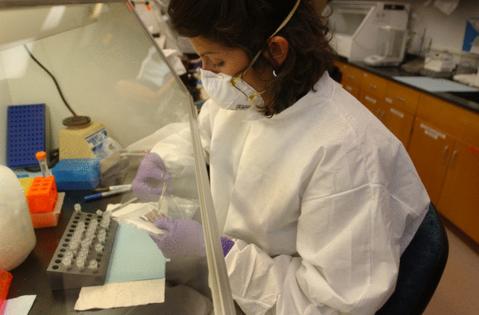Colorado Gov. Jared Polis signs law creating rape kit oversight board, setting 60-day goal for processing
Published in News & Features
DENVER — Calling Colorado’s long turnaround times to process sexual assault evidence kits “simply unacceptable,” Gov. Jared Polis signed a law Tuesday that creates a new review board and will require crime labs to “endeavor” to reach a 60-day testing target for the kits.
Lawmakers introduced Senate Bill 304 after they heard testimony in January that sexual assault victims were waiting more than 500 days for the Colorado Bureau of Investigation to process their forensic exams, commonly known as rape kits.
The new law creates the Colorado Sexual Assault Forensic Medical Evidence Review Board in the attorney general’s office and requires it to make annual reports to the General Assembly. It also requires law enforcement to update sexual assault victims every 90 days if their forensic kit has not been processed.
The state must maintain a public-facing dashboard showing the time it takes to process the kits, and the law says crime labs must “endeavor,” subject to funding and lab capacity, to provide a 60-day turnaround for testing of forensic evidence.
The new law is named after Miranda Gordon, the sexual assault survivor who testified early this year to having waited more than 400 days for her kit to be processed. As of May 31, victims were waiting an estimated 568 days — more than 18 months — for CBI to process their kits.
Gordon said at the signing ceremony Tuesday that she didn’t expect the legislation to result when she testified nearly six months ago. But the new law helped her find “a silver lining in all of this and ensure my assault didn’t happen in vain.”
“It isn’t necessarily — exactly — justice, but it’s a form of justice for me,” Gordon said. “It does feel really good to be a part of making this awful experience not so awful for the people after me.”
Colorado’s rape kit backlog exploded following revelations in 2023 that former CBI analyst Yvonne “Missy” Woods manipulated the results of more than 1,000 DNA tests. But even before that scandal, victims had to wait more than 270 days for CBI to analyze their forensic exams — three times the state’s goal of 90 days.
News of the backlog drew sharp attention from legislators.
In February, lawmakers approved a plan to give CBI more time to spend money earmarked to sort through the Woods scandal, along with explicit permission to use the money to work through the backlog. Members of the legislature also slammed CBI for “a track record of failing to deliver justice to the people of Colorado” and called for an audit of the agency.
Sen. Mike Weissman, an Aurora Democrat and sponsor of SB-304, said he and co-sponsor Rep. Jenny Willford will keep working to improve turnaround times for victims and quicken how fast sexual predators face justice. That includes working on mid-year budget requests and, if the governor calls a special session to deal with federal spending cuts, including the backlog as topics the legislature can address.
“We are not done today,” Weissman said at the bill signing.
Polis said his goal is to get the turnaround time for rape kits down to 60 days. CBI officials, near the end of the legislative session and after the budget had been set, estimated it would cost an extra $3 million per year to staff up enough to reach that goal. It would also take years for CBI to train new hires, officials said.
Polis has called the backlog “inexcusable” and said his office prioritized fixing it as soon as officials learned about it. But he and his staff have not said when Polis learned about the backlog, despite multiple requests.
Asked Tuesday how the backlog reflected on his administration and if he took responsibility for it, Polis said that he sought resources from the legislature to address it as soon as he learned of it. His staff has pointed to the spending extension and expansion request for the CBI’s money earmarked for the Woods scandal.
“It’s completely unacceptable,” Polis said in response to the question Tuesday. “When we found out about the backlog, we immediately requested resources. This is a resource question. It was not something the executive branch could solve alone without resources.”
Willford, the Northglenn Democrat who co-sponsored SB-304, called the new law “urgent for every survivor who is still waiting in the dark.”
It is also personal for her. Willford said she was sexually assaulted by a ride-hailing driver in 2024 — a case that was also caught in the backlog of DNA testing.
She sponsored a bill earlier this year that would have increased vetting requirements for drivers at companies like Uber and Lyft, only for Polis to veto it. Polis wrote in his veto letter that he worried the bill would result in ride-hailing companies leaving the state, as Uber threatened to do.
Willford said Tuesday that she was still processing both events — Polis signing the law aiming to eliminate the rape kit backlog and his veto of the bill intended to increase safety for drivers and passengers of ride-hailing companies. She also lingered on Polis’ response to the backlog — and the need for Gordon to publicly testify in order to draw attention to it.
“It was frustrating that he hasn’t said ‘I’m sorry’ to survivors,” Willford said, “that they’ve been in a backlog that was created on his watch, and it’s frustrating that survivors had to clean up the mess.”
--------------
©2025 MediaNews Group, Inc. Visit at denverpost.com. Distributed by Tribune Content Agency, LLC.







Comments